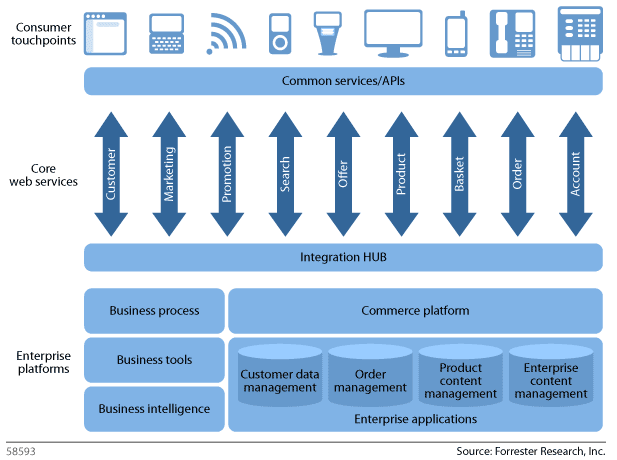Enter the Commerce API
Today Demandware announced their much anticipated Open Commerce API. While many clients may not be in a position to take advantage of this immediately, the value of APIs like this extends well beyond the typical feature release. That value will be in enabling their clients to extend the customer touchpoints they can manage with the core commerce platform well beyond their web and mobile commerce sites. In the era of agile commerce, commerce platforms like Demandware’s will increasingly be leveraged to power many consumer shopping and buying touchpoints such as mobile apps, kiosks, in-store/branch solutions, interactive TV, social commerce, and embedded commerce. You can look to Tesco’s mobile shopping solution in Korea, or Ralph Lauren’s embedded commerce in their New York Times iPad App ads to see how a commerce API can be used. Robust, secure, well supported APIs will enable examples like these to be done in developer friendly ways to streamline development, enable innovation, and ensure quality customer experiences that leverage a consistent back-end commerce solution.
 For eBusiness leaders commerce APIs open up the possibilities for how they can enable additional customer touchpoints while leveraging a consistent set of tools to manage such elements like product content, promotions, merchandising, orders, customer data, and fraud-prevention. Even as various point solutions – including on-premise, hosted, as SaaS – are integrated to the core commerce platform to enable the customer experience and support the business needs, a commerce API can be leveraged to expose those back-end and point-solutions to power these additional touchpoints. This will help the eBusiness leader drive innovation with their own developers at IT teams who can begin to extend the core platform, but will also be help them leverage third parties such as global commerce service providers, agencies, start-ups, and marketing technology providers more effectively.
For eBusiness leaders commerce APIs open up the possibilities for how they can enable additional customer touchpoints while leveraging a consistent set of tools to manage such elements like product content, promotions, merchandising, orders, customer data, and fraud-prevention. Even as various point solutions – including on-premise, hosted, as SaaS – are integrated to the core commerce platform to enable the customer experience and support the business needs, a commerce API can be leveraged to expose those back-end and point-solutions to power these additional touchpoints. This will help the eBusiness leader drive innovation with their own developers at IT teams who can begin to extend the core platform, but will also be help them leverage third parties such as global commerce service providers, agencies, start-ups, and marketing technology providers more effectively.
APIs are not new to developers. Many of them have used SOAP or RESTful APIs for years. But the “productization” of commerce APIs as a core component of a commerce platform is an emerging capability. This will increasingly be a business requirement, moving well beyond a concern only of a developer. Firms such as Demandware and ShopVisible are leading the charge as SaaS providers, but eBusiness leaders can expect on-premise and hosted solutions to support APIs as a feature in the near future. As we research the agile commerce platform of the future, we will be looking closely at this trend and how eBusiness leaders are leveraging these capabilities.